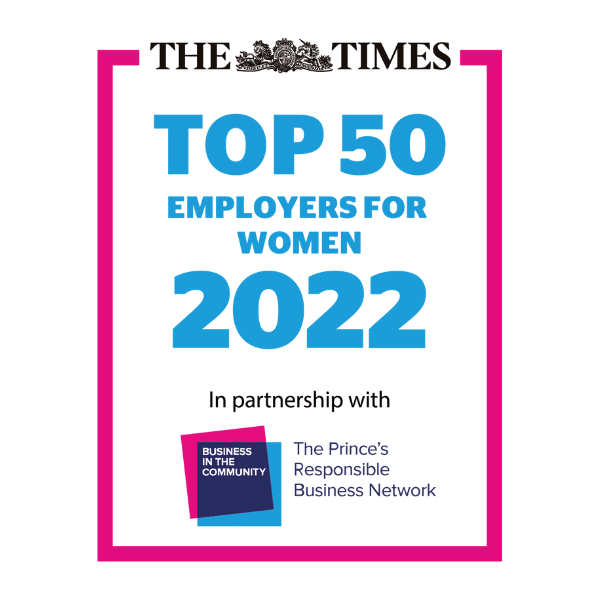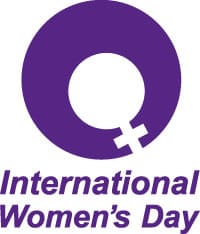The gender gap in tech and other sectors is still a very key issue in 2022. With the gender pay gap in the UK currently meaning that women essentially work for free for nearly 2 months of the year, ensuring employers are focusing on gender diversity is so important. Each year, the Times publishes a list of the top 50 employers who are working hard towards gender equality. The list, created in partnership with Business in the Community (BITC) is a well-established and highly commended achievement for all companies who place on it. In this article we look at who’s made the list for 2022 and what work they’re doing to promote gender equality.

The Times Top 50 Employers for Women has been being published each year since 2011 and features companies of many different sizes and industries. Many tech companies are featured showing the push for decreasing the gender gap in technology – currently in the UK only 26% of the tech workforce are women. Gender diversity experts from BITC carefully consider four different areas for assessment; the organisation’s overall approach to driving progress, policies on areas such as flexible working/parental leave, the broader integration of organisational culture and the role of data in their plans. The report continues to drive change and showcases the companies featured as an example for others to follow. BITC states that they hope the report will help to inspire more employers to be ‘bolder, braver and faster’ in the journey to achieving gender equality.
This year, due to being so highly contested, the list features 51 companies.
The Times Top 50 Employers for Women 2022:
- Accenture
- Addleshaw Goddard LLP
- Allen & Overy
- Anglo American
- Atos IT Services UK Ltd
- Aviva
- AXA UK
- Bain & Company
- Burges Salmon LLP
- Capgemini UK
- Centrica PLC
- CityFibre
- CMS
- Deloitte
- Department for Work and Pensions
- Deutsche Bank
- Diageo
- DWF
- Enterprise Rent-A-Car
- Eversheds Sutherland
- Fidelity International
- Financial Conduct Authority
- Fujitsu
- GlaxoSmithKline
- Goldman Sachs International
- Grant Thornton UK LLP
- Hachette UK
- J.P. Morgan
- Jacobs UK Ltd
- Kellogg’s
- KPMG UK LLP
- Linklaters LLP
- Lloyds Banking Group
- Morgan Stanley
- MI5
- National Grid
- NatWest Group
- Network Rail
- Norton Rose Fulbright
- Ofcom
- PepsiCo UK & Ireland
- PwC LLP
- Sainsbury’s
- Santander UK plc
- Shell UK
- Tesco Stores Ltd
- TSB PLC
- Vodafone UK
- Wates Group
- Willmot Dixon
- Worldline IT Services UK Limited
The companies above have proved that they’re committed to providing a safe, supportive and inclusive work environment for women. BITC produces a report along with the list which highlights high performing areas and examples of best practice which they saw in the judging.
What are companies doing well?
Here are a few things the companies who feature on the top 50 employers for women do which sets them apart:
Policies and initiatives to support women
Ensuring women feel valued and supported throughout their role with a company is consistently highlighted as important by BITC. Policies for things like parental leave, maternity support, miscarriage and menopause are hugely important to women and companies showing initiative in these areas performed best. Also, women’s network groups are a great way of creating a community where women can feel safe and supported in their personal and working lives. Since the pandemic, many people are continuing to work from home more often which although can be a great thing for flexibility of working, can also cause feelings of isolation and loneliness. Regular check-ins and mental health wellbeing courses ensure employers continue to offer support throughout different backgrounds and life stages. An example of this in practice comes from Vodafone, who have a return to work programme and Enterprise Rent-A-Car who have a ‘wellness passport’ which allows for individual adjustments to working such as flexibility.
Data monitoring
The collection of employee data to monitor diversity and inclusion allows a company to take responsibility and accountability for their D&I strategies. Reporting on gender pay gaps is now a legal requirement for businesses over 250 employees, and many companies have taken this opportunity to publish diversity reports too which focus on areas such as gender, race, age and sexuality. The surveys can also lead to valuable insights from employees on areas where improvements could be made to make them feel supported. This was the case at Wates Group, where they introduced enhanced partner leave after a focus group session.
Career progression
It’s widely found that women are much more likely to experience microaggressions at work – 42% of ethnically diverse women felt that they have been passed over for a promotion. By removing barriers to progression and ensuring women feel they have opportunities for development and to thrive in their career, companies in turn will have happier employees. Things like increasing the visibility of role models in the company through things like webinars, mentorship schemes and sponsorship can all help women feel more motivated and supported to achieve their goals and progress within the company.
Recruitment
In order to reduce the gender gap in their companies, organisations are also changing their recruitment strategies to be more inclusive and hire more talented women. Examples of this include things like unconscious bias training, implementing blind hiring and making sure interview panels are diverse. Being more open to flexible roles where employees can work from home or flex their hours can also help to attract more women, which is something the companies on the list are doing more of even out of the pandemic. Ofcom have made multiple changes to their recruitment process resulting in 55% of jobs being offered to women in 2021.
These are just a few examples of the things companies can implement to their work culture to become more inclusive and supportive of women. By publishing the top 50 employers for women each year, The Times and BITC encourage more and more employers to strive to be better and help to close the gender gap which is still so apparent in so many sectors.
Read more about the best technology companies for women and learn 5 actions tech employers can take to retain women.



